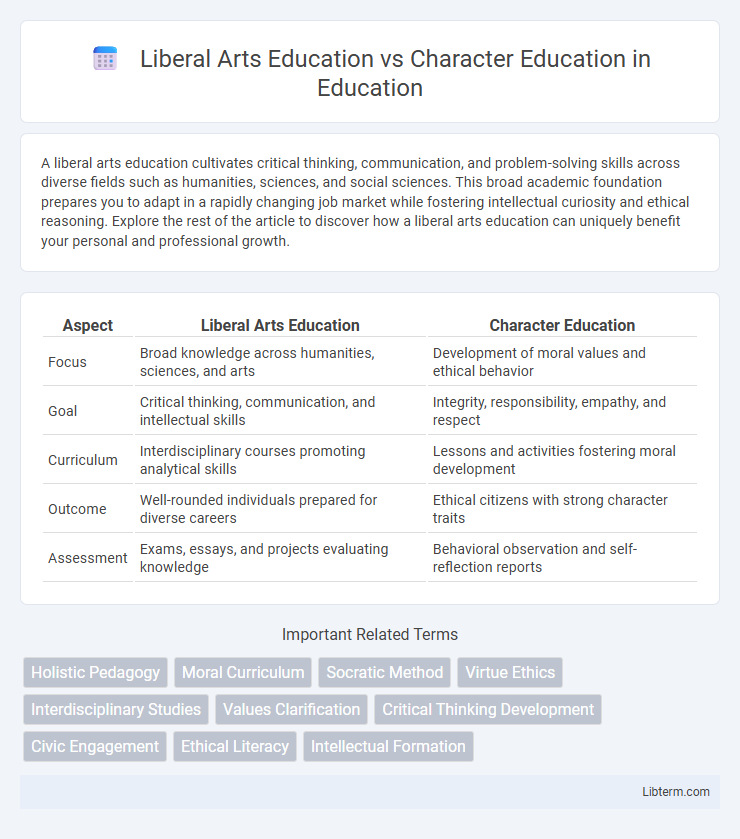A liberal arts education cultivates critical thinking, communication, and problem-solving skills across diverse fields such as humanities, sciences, and social sciences. This broad academic foundation prepares you to adapt in a rapidly changing job market while fostering intellectual curiosity and ethical reasoning. Explore the rest of the article to discover how a liberal arts education can uniquely benefit your personal and professional growth.
Table of Comparison
| Aspect | Liberal Arts Education | Character Education |
|---|---|---|
| Focus | Broad knowledge across humanities, sciences, and arts | Development of moral values and ethical behavior |
| Goal | Critical thinking, communication, and intellectual skills | Integrity, responsibility, empathy, and respect |
| Curriculum | Interdisciplinary courses promoting analytical skills | Lessons and activities fostering moral development |
| Outcome | Well-rounded individuals prepared for diverse careers | Ethical citizens with strong character traits |
| Assessment | Exams, essays, and projects evaluating knowledge | Behavioral observation and self-reflection reports |
Defining Liberal Arts Education
Liberal Arts Education encompasses a broad interdisciplinary curriculum designed to develop critical thinking, communication, and analytical skills across humanities, sciences, and social sciences. It emphasizes intellectual exploration, fostering creativity, ethical reasoning, and a well-rounded knowledge base that prepares students for diverse career paths and civic engagement. Unlike Character Education, which centers on moral development and personal virtues, Liberal Arts Education prioritizes intellectual growth and the cultivation of adaptable, lifelong learners.
Understanding Character Education
Character education emphasizes the development of core moral values, ethical reasoning, and social responsibility, fostering individuals who act with integrity and empathy. Unlike liberal arts education, which prioritizes broad intellectual skills and critical thinking across diverse disciplines, character education concentrates on shaping habits, attitudes, and personal virtues. Effective character education integrates experiential learning and reflection to cultivate emotional intelligence and collaborative skills essential for responsible citizenship.
Historical Origins and Evolution
Liberal arts education traces its origins to Ancient Greece, where the trivium and quadrivium formed the foundation of a broad intellectual curriculum aimed at cultivating critical thinking and civic responsibility. Character education evolved primarily from religious and philosophical traditions, emphasizing moral virtues and ethical behavior as seen in Confucianism and Medieval Christian teachings. Over centuries, liberal arts expanded to include sciences and humanities, while character education integrated psychological theories, shaping modern approaches to holistic student development.
Core Objectives and Philosophies
Liberal arts education emphasizes critical thinking, interdisciplinary knowledge, and intellectual inquiry as its core objectives, aiming to cultivate well-rounded individuals prepared for diverse challenges. Character education focuses on developing moral virtues, ethical behavior, and social responsibility, prioritizing personal integrity and community engagement. While liberal arts fosters cognitive skills and broad knowledge, character education centers on shaping values and emotional intelligence for holistic personal growth.
Curriculum Structure and Content
Liberal arts education emphasizes a broad curriculum encompassing humanities, sciences, mathematics, and social sciences designed to develop critical thinking, communication, and analytical skills across diverse disciplines. Character education curriculum centers on moral development, ethical reasoning, and social-emotional learning aiming to foster virtues such as responsibility, empathy, and integrity. While liberal arts promotes intellectual versatility through interdisciplinary content, character education integrates values-based lessons often through experiential activities, community engagement, and reflective practices.
Skills and Competencies Developed
Liberal arts education cultivates critical thinking, analytical reasoning, and effective communication through a broad interdisciplinary curriculum encompassing humanities, sciences, and social sciences. Character education emphasizes the development of ethical judgment, emotional intelligence, empathy, and resilience by fostering core values and social-emotional skills. Both approaches contribute complementary competencies, with liberal arts focusing on cognitive and intellectual skills, and character education prioritizing moral and interpersonal abilities essential for holistic personal and professional growth.
Impact on Personal Development
Liberal Arts Education cultivates critical thinking, creativity, and a broad knowledge base, fostering intellectual growth and adaptability in various contexts. Character Education emphasizes values such as integrity, empathy, and responsibility, shaping moral judgment and emotional intelligence essential for ethical decision-making. Together, they complement personal development by balancing cognitive skills with strong character formation, preparing individuals for meaningful societal contributions.
Societal and Career Outcomes
Liberal arts education fosters critical thinking, creativity, and adaptability, equipping students for diverse career paths in a rapidly changing job market. Character education emphasizes ethical behavior, responsibility, and social-emotional skills, promoting positive societal outcomes such as civic engagement and community cohesion. Combining both approaches can enhance employability while cultivating socially responsible citizens who contribute meaningfully to society.
Criticisms and Challenges
Liberal arts education faces criticism for its perceived lack of direct job market relevance and insufficient focus on practical skills, leading to concerns about graduate employability. Character education is challenged by its subjective definitions of morality and difficulty in measuring outcomes, raising debates about cultural bias and implementation consistency. Both approaches struggle with balancing theoretical knowledge and personal development while addressing diverse societal needs.
Integrating Liberal Arts and Character Education
Integrating liberal arts education with character education fosters critical thinking, ethical reasoning, and emotional intelligence, equipping students with a holistic skill set for both professional and personal success. The liberal arts emphasize interdisciplinary knowledge and analytical skills, while character education cultivates virtues such as integrity, empathy, and responsibility. Combining these approaches enhances students' ability to navigate complex social challenges and make values-driven decisions in diverse contexts.
Liberal Arts Education Infographic

 libterm.com
libterm.com